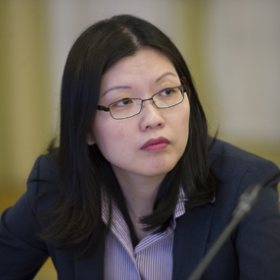
2nd U.S.-China High-Level Political Party Leaders Dialogue
After North Korea’s artillery attack on the South Korean island of Yeonpyeong last month, the United States increased pressure on China to respond forcefully to North Korea, which further complicated an already strained U.S.-China relationship. With Chinese President Hu Jintao’s visit to the United States fast approaching in January, it is crucial that differences of approach to the Korean crisis not derail the bilateral relationship.
The Korean crisis was just one of several topics addressed at the EastWest Institute’s 2nd U.S.-China High-Level Political Party Leaders Dialogue, which convened prominent U.S. Democrats and Republicans with senior representatives of the Communist Party of China (CPC), from December 1-3 in Washington, D.C
This was the first ever visit to the United States by a delegation of CPC officials. The visit was all the more significant because the leader of the Chinese delegation, Mr. Wang Jiarui, Minister of the International Department of the Central Committee of the CPC (IDCPC), is a key negotiator with the North Korean leadership. Former U.S. Secretary of State Madeleine K. Albright (D) and former U.S. Ambassador to the United Nations Richard S. Williamson (R) led the U.S. delegation. [Click here for a list of principal delegates.] This CPC visit to Washington, D.C. reciprocated a visit to Beijing by the U.S. delegation in March and April of 2010.
The Chinese delegation also met with Acting U.S. Secretary of State James Steinberg to discuss a range of issues related to the U.S.-China relationship, including the current North Korea crisis and expectations regarding President Hu’s upcoming visit.
The off-the-record talks, which spanned two days, included a discussion of possible best responses to North Korea’s recent actions and ideas for de-escalating conflict on the Korean peninsula. Delegation members also shared their views on Afghanistan, Pakistan, Iran, Myanmar/Burma, and Sudan.
To help provide a context for foreign policy decision-making as a whole, the two sides presented information on their domestic political landscapes and governance challenges, with special emphasis on how these landscapes and challenges bear on U.S.-China relations. The U.S delegation interpreted the results of the November 2010 mid-term elections and key electoral issues, from low approval ratings for the Obama administration to the emergence of the Tea Party. The Chinese summarized their 12th Five-Year Plan, aimed at addressing key problems including uneven development in urban and rural areas, and between the eastern and western parts of the country; environmental degradation; and an economy driven by exports and investment rather than domestic consumption.
Both delegations also spoke candidly about other problems in U.S.-China relations, including human rights, trade frictions, and U.S. arms sales to Taiwan.
In presentations and discussions, members of both delegations recognized the need for open channels of communications between the United States and China – not just to resolve specific challenges such as North Korea, but to build cooperation and communication in a broader sense.
According to Wang, the U.S.-China High-Level Political Party Leaders Dialogue represents “a historic contribution to the development of U.S.-China relations.” By laying the foundation for an ongoing dialogue between the two political establishments, the visit was an important step toward forging strategic trust between the two countries.
Note: Along with EWI and the CPC, the National Democratic Institute (NDI) and the International Republican Institute (IRI) also played significant roles in organizing this event. The third and fourth iterations of the dialogue are scheduled for next spring in China and next fall/winter in the United States.
_

